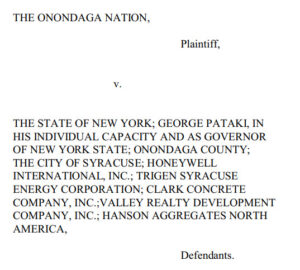
PRESS RELEASE: March 11, 2005
Onondaga Nation Communications
ONONDAGA NATION ANNOUNCES LAND RIGHTS ACTION PROMISING NO EVICTIONS
Law Suit Asserts Rights to Historic Territory That Stretches From Pennsylvania to Canada
Onondaga Nation Territory—In a historic legal filing, the Onondaga Nation today asserted its rights to a wide stretch of New York State land while insisting that this action will not result in any evictions.
“The Onondaga people wish to bring about a healing between themselves and all others who live in this region that has been the homeland of the Onondaga Nation since the dawn of time,” said Sid Hill, Tadadaho (spiritual leader) of the Onondaga Nation. “We want justice. New York State took our land illegally and needs to acknowledge this injustice and our rights to the land. But we will not displace any of our neighbors—the Onondaga know all too well the pain of being forced to leave our homes and do not wish that on anyone.”
The land rights action petitions the federal court to declare that it was illegal for New York State to take Onondaga lands and that the title to that region continues to belong to the Onondaga Nation. The land area includes the Onondaga Nation’s historic territory, which encompasses not only Syracuse and Onondaga Lake, but stretches south past Binghamton and north past Watertown.
The suit names as defendants the State of New York, the City of Syracuse, and Onondaga County, as well as five corporations who are named for their environmental damage:
Honeywell International, Inc., which owns several industrial properties along the southwest shore of Onondaga Lake, where, from the 1880s until the 1980s, Honeywell and its predecessor companies operated various chemical plants whose pollution has turned the lake into the most polluted body of water on this continent.
Clark Concrete Company, and its subsidiary, Valley Realty Development, which own the Tully gravel mine that has degraded the headwaters of Onondaga Creek. The mining area also contains areas of extreme archaeological and cultural sensitivity for the Onondaga Nation.
Hansen Aggregates and its subsidiaries, which own the “Jamesville quarry” that sprawls across portions of the towns of DeWitt and LaFayette and is one of the largest open pit mines in New York State.
Trigen Syracuse Energy Corporation, which owns an energy “cogeneration” plant in the Town of Geddes that burns a combination of coal and plastic/paper waste and whose emissions include large quantities of hydrochloric acid and dioxins.
“The incomplete plan to clean up Onondaga Lake is only the latest example of the New York State and federal authorities’ inability to care for our land,” said Hill. “In asserting our land rights, we insist that polluted areas be cleaned up and that the lands and waters be protected for generations to come.”
“The Onondaga will not settle for methods used to resolve other Native American nations’ land rights actions,” said Hill. “We do not want to open or operate casinos. Our values do not allow for the harm that casino gambling can cause. We want this action resolved in a way that preserves, not disrupts, the social fabric of our Nation as well as that of our neighbors.”
The land rights action is based on New York’s violation of the U.S. Constitution and the 1790 Federal Trade and Intercourse Act, which make it illegal to acquire Native American land without federal government approval. New York State supposedly acquired the Onondaga lands through a series of agreements in 1788-90, 1793, 1795, 1817, and 1822 without federal approval. The taking of the Onondaga Nation lands also violated the 1784 Treaty of Fort Stanwix and the 1794 Treaty of Canandaigua between the United States and the Six Nations or Haudenosaunee, as well as Haudenosaunee laws.
The Nation and its people have a unique spiritual, cultural, and historic relationship with the land, which is embodied in Gayanashagowa, the Great Law of Peace. This relationship goes far beyond federal and state legal concepts of ownership, possession, or other legal rights. The people are one with the land and consider themselves stewards of it.
“It is the duty of the Nation’s leaders to work for a healing of this land, to protect it, and to pass it on to future generations,” Hill concluded. “The Onondaga Nation brings this action on behalf of its people in the hope that it may hasten the process of reconciliation and bring lasting justice, peace, and respect among all who inhabit this area.”
